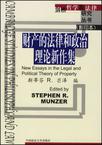财产的法律和政治理论新作集
2003-11
政法大学
斯蒂芬 R.芒泽 编
211
在法律哲学和政治哲学领域,围绕着财产权问题总是聚讼纷红。像柏拉图、洛克、康德、黑格尔和马克思这样一些思想家,对财产观念都提出了不同的看法。这本新文集的论文由本领域一些声名显赫的学者撰写,这些文章运用明显不同的技术、透过不同的视角探讨了财产理论中最为核心的一些问题。 本书的论文讨论了财产是否能够粗暴而不受惩罚地被疏散或使用,分析了一个人的财产在他去世后应该如何分配。这些文章考察了知识产权在目前的经济图景,说明了洛克对私有财产正当性的著名论证因版权和专利权而面临的动摇。它们还表明,谨慎地对财产制度予以证明是多么地重要。 这些论文的多样性和原创性说明,在对人文学科和社会科学的认识探索方面,财产理论如今已是最激动人心的领域之一。木书将引发哲学、法律、社会政策、政治理论和批判法律研究等领域学者的兴趣。它的清晰明朗使得它也能适合于一般读者阅读。 Strphen R.Munzer是加利福尼亚大学洛杉矾分校法学院的法律教授。他的著述涉及法律和政治理论、生物工艺学和宗教哲学等广泛的领域。他是《一种财产理论》一书(剑桥大学出版社,1990)的作者。
Stephen R.Munzer is Professor of Law at the UCLA School of Law. He has biotechnology, and philosophy of religion and is the author of A Theory of Property(Cambridge University Press, 1990).
ContributorsPreface and AcknowledgmentsIntroduction STEPHEN R. MUNZER1 Property, Honesty, and Normative Resilience JEREMY WALDRON2 Property as Social Relations STEPHEN R. MUNZER3 Must We Have the Right to Waste? EDWARD J. MCCAFFERY4 Inheritance and the Justice Tribunal J. W. HARRIS5 Lockean Arguments for Private Intellectual Property SEANA VALENTINE SHIFFRIN6 Theories of Intellectual Property WILLIAM FISHERTable of CasesIndex of NamesIndex of Subjects
Under the income-plus-estate tax, Perot paid no taxes on account of this largesse; indeed, he saved his estate more than $30 million in taxes - present consumption being the surest way to avoid an estate tax. Under the Modest Proposal, in order to spend $60 million on himself, Perot would have had to pay nearly $140 null ion to the collective fist. B. A parallel objection looks to the power that wealth-holders might have by virtue of investment decisions and control over the Trust Accounts. Once again, however, the objection sits poorly with a revised conception of owner- ship, one without a right to waste. Under the Modest Proposal, savers will be hemmed in by a general fiduciary duty much like the pedant investor rule that any trustee must follow. Society need not micro-manage or engage in overly specific regulation of Trust Account holders. A sensible diversification rule -the kinds of policies already in place for regulating large endowments, banks, and mutual funds, as well as pension plan and IRA investments - is quite sufficient. This further implements an ant waste norm. The reasonable society can control and contain the power of the capitalist class to influence policy and politics via its expenditure decisions - in fact, the Modest Proposal gives us a means of serving this reasonable political end that modern institutional theory otherwise altogether lacks. At a minimum, the laws can prolixity lobbying or running for office out of Trust Account funds, as it does now for nonprofit sector monies. Once again, we can understand this feature as following from the systematic decision to monitor the use of resources - to abrogate the private right to waste. Under the Modest Proposal and a life estate conception of ownership, the wealthy cannot be motivated by narrow decadent pleasures nor by a quest for excessive power. They must be motivated, instead, by a sense of "natural duty," a pride in their accomplishments, a desire to provide a fund for the urgent needs of their family and their posterity, and to do well by us all. They must, that is, serve as allies, not enemies, to the reasonably pluralist society of which they are members. C. A final version of the standard liberal objection relates to the social problem of iteration over time. A plausible interpretation of the relevant aspects of Rawls's theory and the political liberal project is this: The task of justice as fairness - of the reasonable society -is to set up the fair terms and conditions of background justice. Once these are in place, in part to avoid the problems of placing an overly restrictive moral psychology or sense of individual duty on its citizens, a reasonable society will sit back and allow citizens to engage in trade, transactions, and the voluntary contributions to cooperative enterprises. But the net result of these voluntary transactions, when repeated over tim. ……
* Contains original contributions from some of the most eminent scholars in the field * Covers a broad range of topics such as inheritance, intellectual property, critical legal studies, and property institutions * Will be of interest to professionals and students of philosophy, law, social policy, and political theory There has always been much controversy surrounding property rights in legal and political philosophy. Thinkers such as Plato, Locke, Kant, Hegel and Marx have all offered different views on the idea of property. This collection of new essays, written by some of the most eminent scholars in the field, examines the most central issues of property theory using markedly different techniques and perspectives, The essays discuss whether property may be dissipated or used imprudently with impunity and analyze how a person's property should be distributed after death. They survey the current economic landscape of intellectual property and show that Locke's celebrated justification for private property falters when it comes to copyrights and patents. They also demonstrate how important it is that institutions of property be carefully justified. The variety and originality of these essays are evidence that the theory of property is now one of the most exciting areas of intellectual inquiry in the humanities and social sciences. This volume will be of interest to professionals and students of philosophy, law, social policy, and political theory.

字这么小,是不是缩印了呀,看着齁累的。封面比较干净,还不错。